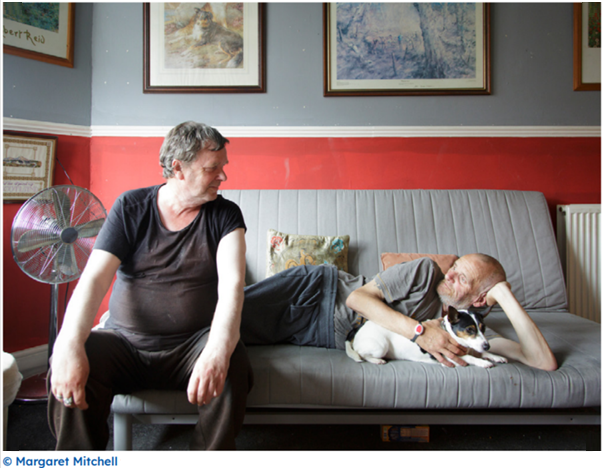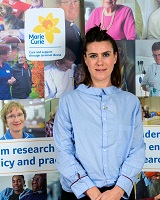
Dying in the Margins
This 4 year research project (2019-2023), supported by Marie Curie and funded by the Economic and Social Research Council, part of UKRI, aimed to examine people’s experiences of home dying in a context of financial hardship and deprivation in the UK.
See below for information about our research, images and free educational resources.


Study Background
Dying in the Margins examined people’s experiences of dying at home in a context of financial hardship and deprivation in the UK. Most people wish to die at home, yet those living in more socio-economically deprived areas are less able to do so than people in less deprived areas.
The overarching aim of the research was to examine barriers to, and experiences of, home dying for people experiencing poverty in the UK.
This was the first UK study to use visual methods to explore home dying for people struggling to make ends meet. Participants with serious advanced illness and financial hardship used cameras (photovoice) to record their daily lives, and documentary photographer Margaret Mitchell worked with participants to create portrait and documentary images. We also worked with bereaved family carers to create digital stories about their experiences supporting a person experiencing financial hardship at the end of life.
We held exhibitions in Glasgow and at the Scottish Parliament in 2023, sharing these stories and asking audiences: What could be designed or distributed differently to ease people's distress in the final months of their lives?
The Cost of Dying Exhibition
Data collection for the study commenced in 2021. Since then, the project has generated imagery of end of life experiences seldom seen or considered by society at large. This work has now culminated in a public exhibition: The Cost of Dying.
The exhibition brings together photographs taken by Margaret Mitchell, participants' own images, and digital stories. The exhibition is designed to inform the public conversation around improving the end of life care for those living with poverty and structural disadvantage.
Exhibition dates
- Palliative Care Congress, Edinburgh International Conference Centre, 16 - 17 March 2023
- Advanced Research Centre (ARC), University of Glasgow, 25 April - 5 May 2023
- The Mitchell Library, Glasgow G3 7DN, 20 June - 19 August 2023
- Scottish Parliament (MSPs exhibition), Holyrood, 14 - 16 November 2023
Exhibition Brochure
We invite you to read our Cost of Dying Exhibition Brochure which provides background on the study, more details about our participants and highlights key themes and findings.
Media
The Cost of Dying Exhibition has been covered by the following outlets and publications:
- BBC News: The photos that chronicle the cost of dying
- Big Issue: The devastating impact the cost of living is having on the cost of dying
- Marie Curie: "Mum knew she was going to die, but she also didn't have any money to pay for anything"
- Medium.com: The Cost of Dying: Margaret Mitchell, & Dying in the Margins at Glasgow University
Exhibition Images
Digital Stories
We have worked with bereaved carers to create short digital stories - 2-3 minute videos using images, music and voice-over. Each digital story shares a part of a bereaved carer’s experience and the experiences of those they cared for, using their own words.
Our digital stories are free to access and use. We want them to be used as widely as possible to educate and inform clinical and palliative care specialists, social care professionals, volunteers, as well as individuals in our communities who are carers or may become carers in the future. Each video also includes an accompanying toolkit which provides additional context, learning objectives and suggested discussion points.
Full transcripts for the digital stories are available on request.
Linda's story:
Linda's story is told by her daughter Nicola. Key issues in this story include the substantial costs that can be incurred when caring for people at the end of life and how the physical environment can be a barrier to home dying.
You can also download the accompanying resource: Linda's story toolkit.
Steven’s story:
Steven's story is told by his brother John. This digital story is about the complexities of the welfare system, the role of supporting agencies, and the importance of affordable transport.
You can also download the accompanying resource: Steven's story toolkit.
Barry's story:
Barry's story is told by his wife Jo. This digital story is about financial barriers to dying at home, the cost of private care, and resources that can help somebody with a serious advanced illness to die at home.
You can also download the accompanying resource: Barry's story toolkit.
Frank's story:
Frank's story is told by his daughter. Key themes in Frank’s story are the physical inaccessibility of the home affecting care provision, financial struggles in caring for a terminally ill family member, and the emotional impact on carers when unable to support a loved one to die at home.
You can also download the accompanying resource: Digital Story Toolkit - Frank
Feedback:
Your feedback is important to us. If you have any comments on our digital stories, please contact Dr Naomi Richards.
Money Matters at the End of Life Resource
Throughout our study, we observed that there can be discomfort and uncertainty among professionals about how to communicate effectively with people who are facing material or financial difficulties at the end of life.
To aid conversations and to support professionals working with people at end of life, we have developed a free resource called Money Matters at the End of Life: Having Open Conversations about Financial Hardship at the End of Life.
The new Money Matters at End of Life guide provides practical tips and guidance for health and social care professionals on how to initiate and conduct conversations about poverty and hardship with people who are terminally ill or bereaved, as well as signposting to relevant sources of information and support.
Parliamentary Debate and Joint Briefing
Joint Briefing (May 23)
In May 2023, following the Cost of Dying exhibition at the University of Glasgow Advanced Research Centre, we worked with colleagues at Marie Curie to produce a Dying in the Margins Joint Briefing May 2023 containing policy recommendations for improving services for people experiencing financial hardship at the end of life.
Briefing for Members Business Debate (Nov 23)
The Dying in the Margins project team, in collaboration with Marie Curie, has released a MSP Briefing for Parliamentary Members Business Debate on 16/11/23, highlighting the urgent need for the Scottish Government to address end-of-life poverty by including terminally ill individuals in energy bill support, providing robust social security for them and their carers, and ensuring timely, affordable home adaptations.
Parliamentary Debate
Other Documents
Dying in the Margins has also been featured in the following policy documents and reports:
Our Team
Our Team

Dr Naomi Richards
Principal Investigator (University of Glasgow)
Senior Lecturer (School of Interdisciplinary Studies)
Contact: Naomi.Richards@glasgow.ac.uk / 01387 702063
Dr Naomi Richards is Lecturer in End of Life Studies at the University of Glasgow. Prior to joining Glasgow in 2015, she held positions at the University of the West of Scotland and the University of Sheffield. Naomi is a social anthropologist specialising in death and dying, ageing and old age, and visual and ethnographic methods. Over the last decade she has been funded by the ESRC to undertake empirical and theoretical investigations into the UK right-to-die debate and the phenomenon of old age rational suicide. She is also involved in two Wellcome Trust funded case studies. The first examines the relationship between palliative care and assisted dying in three jurisdictions where the practice is lawful. The second examines the global transfer and translation of the Death Café phenomenon.

Dr Sam Quinn
Reseach Associate (University of Glasgow)
Contact: Sam.Quinn@glasgow.ac.uk
Dr Sam Quinn joined the End of Life Studies group in July 2021. He previously held the position of Research Fellow at the University of Edinburgh, School of Health in Social Science. Sam completed his Doctoral research on the end of life experiences of people with Down syndrome and Dementia in December 2019. This ethnographic work explored the experiences of people living and working in a group home for people with learning disabilities and dementia. Sam has worked on a range of qualitative research projects encompassing quality improvement in the third sector, frontline health staff experiences of working during COVID-19, and a project to facilitate discussions about risk with forensic inpatients with a learning disability.

Dr Emma Carduff
Research Lead (Marie Curie Hospice, Glasgow)
Dr Emma Carduff is the Research Lead at Marie Curie Hospice, Glasgow. She trained as a nurse at the University of Glasgow and completed a Master’s degree in Public Health Research, then a PhD in research methods for palliative care research from the University of Edinburgh. Dr Carduff is responsible for facilitating, managing and leading research activity at the hospice and collaborates with academic colleagues nationally and internationally. Her particular research interest is the health and wellbeing of unpaid carers of people with terminal illness and she is Advocate Member for the International Palliative Care Family Carer Research Collaboration (IPCFRC) for Scotland. Dr Carduff is also passionate about ensuring equality in end of life experience for those in marginalised groups, including those living with socio-economic deprivation, homelessness and prisoners. In addition, Dr Carduff has experience of working collaboratively with patient and public involvement groups within organisations and those established for specific projects.

Professor Merryn Gott
Associate Head - Research (Te Arai Palliative Care and End of Life Research Group)
Merryn directs the Te Arai Palliative Care and End of Life Research Group based at the University of Auckland. The group conducts multi-disciplinary bicultural research using creative social research methods to inform practice, policy, and teaching in palliative and end of life care both nationally and internationally. Merryn has been conducting research with older people for over 20 years and has a particular interest in developing models of palliative and end of life care to meet the needs of ageing populations. Her research programme has been supported by substantial grants from the HRC, UK Department of Health, Research Councils and Health Charities.
Academic Outputs
- Quinn, S. & Richards, N. (2024). The Cost of Dying Exhibition: public, professional and political reactions to a visual exhibition depicting experiences of poverty at the end of life. Medical Humanities.
- Richards, N., Quinn, S., Carduff, E. & Gott, M. (2024). Dying in the margins: Experiences of dying at home for people living with financial hardship and deprivation. Social Science & Medicine - Qualitative Research in Health.
- Quinn, S., Ferguson, L., Read, D. & Richards, N. (2024). “The great escape”: how an incident of elopement gave rise to trauma informed palliative care for a patient experiencing multiple disadvantage. BMC Palliative Care.
- Stirrups, R., 2024. Dignity and inequality at the end of life. The Lancet Oncology.
- Richards, N. , Quinn, S. , Gott, M., Carduff, E., Mitchell, M. and Dooley, O. (2023) Dying in the Margins: The Cost of Dying Exhibition Guide. (doi: 10.36399/gla.pubs.331617)
- Richards, N. and Quinn, S. (2023) Money Matters at the End of Life: Having Open Conversations About Financial Hardship at the End of Life. University of Glasgow. (doi: 10.36399/gla.pubs.331620
- Quinn, S., Richards, N. & Gott, M. (March 2023) Dying at home for people experiencing financial hardship and deprivation: How health and social care professionals recognise and reflect on patients’ circumstances. Palliative Care and Social Practice.
- Richards, N., Quinn. S., Mitchell, M., Carduff, E. & Gott, M. (January 2022) The viability and appropriateness of using visual methods in end of life research to foreground the experiences of people affected by financial hardship and deprivation. Pallitative Medicine.
- Richards, N., (2022). The equity turn in palliative and end of life care research: Lessons from the poverty literature. Sociology Compass
- Rowley, J., Richards, N., Carduff, E. & Gott, M. (September 2021) The impact of poverty and deprivation at the end of life: a critical review. Palliative Care and Social Practice.
- Richards, N. and Rowley, J. (January 2021) Can Dying at Home During Covid-19 Still Be an Indicator of ‘Quality Of Death’?, Policy Scotland
- Richards, N. and Rowley, J. (May 2020) Structural inequalities and dying at home during COVID-19, Policy Scotland
- Richards, N. (May 2020) Is Covid-19 exacerbating inequities in end of life experience? The Herald

